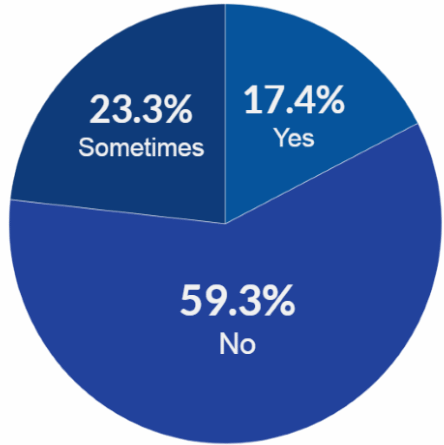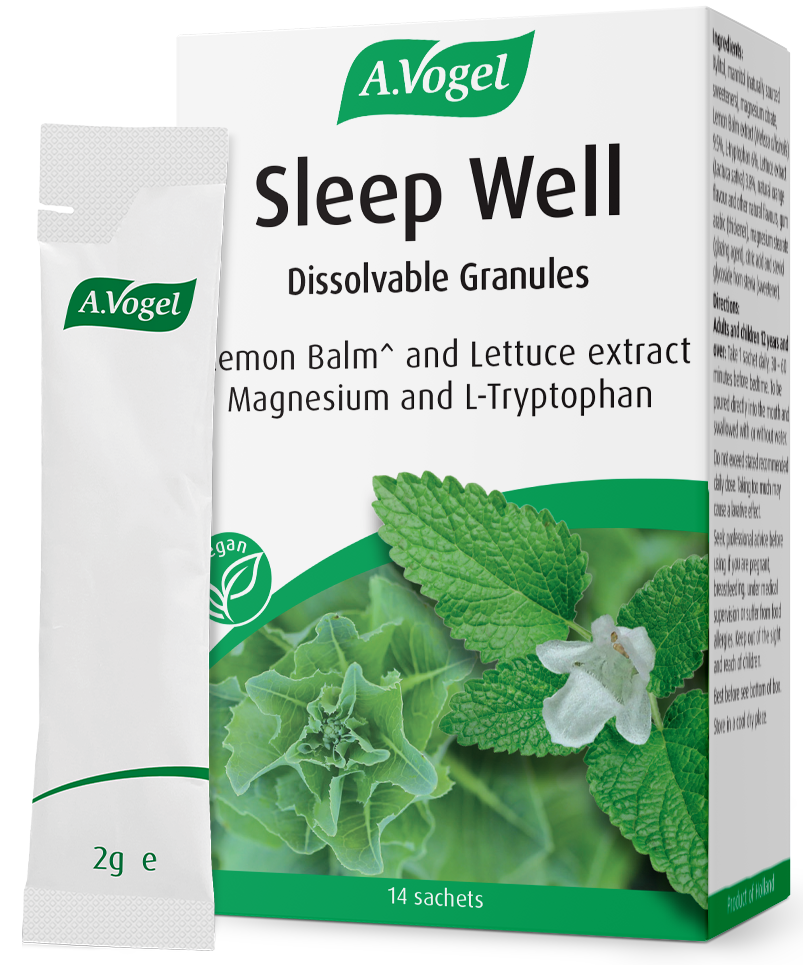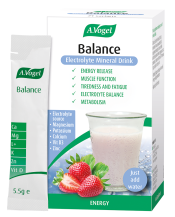How much does alcohol affect your energy?
Do you like a nightcap before bed? The 2017 Great British Bedtime Report found that 25% of Brits admitted to having a little bedtime tipple to help them sleep.1 Although alcohol can help you to fall asleep, it does not guarantee a good night's sleep! Alcohol can affect your sleep and have a negative affect on your energy. There are several reasons for this, including the fact that it:
- Prevents REM sleep
- Interrupts your circadian rhythm
- Strips your body of vital nutrients
- Leads to frequent urination
- Impairs blood sugar.
1. Prevents REM sleep
If you've visited our A.Vogel Talks Sleep page you'll know that REM sleep is an important stage of sleep where dreaming occurs. REM sleep has been associated with several benefits, such as improving your memory, concentration and mood. However, research has found that drinking excessive amounts of alcohol can interrupt REM sleep.2
A lack of REM sleep may lead to frequent waking, restless sleep and possibly nightmares. This can make you feel tired the next day and may lead to day time naps which can make it more difficult to fall asleep at night. As I mentioned above, REM sleep helps to boost memory and concentration. So, after a night on the booze you may also feel sluggish, and find it harder to focus and concentrate.
Furthermore, efficient sleep is needed to help maintain a healthy immune system. During sleep your body produces and releases cytokines (proteins that regulate the body's immune response). If you are regularly losing out on sleep your body will produce fewer cytokines, putting you at risk of developing a cold or flu.
On average, it takes your body 1 hour to metabolise 1 unit of alcohol;3 however, this depends on several factors, including:
- Your weight
- The type and strength of alcohol
- How much food you've consumed
- Your age.
If you drink a large (250ml) glass of wine containing 3 units of alcohol, or a pint of strong lager, your body can take around 3 hours to break down the alcohol. Going to bed with alcohol still in your system may block REM sleep, as well as causing you to wake early in the morning and struggle to get back to sleep. So, if you're drinking alcohol, ensure that you stop in plenty of time before going to bed to allow your body time to break down the alcohol.
2. Interrupts your circadian rhythm
Your circadian rhythm (also known as the sleep/wake cycle) determines when it is time to go to sleep and stay awake. As well as this, the circadian rhythm is responsible for regulating mood. Serotonin is a neurotransmitter that controls the sleep and waking cycle, and helps to keep us happy and energised. Regular alcohol consumption lowers serotonin levels in the brain. Low serotonin levels are linked to poor sleep and low mood.4
Alcohol also reduces melatonin levels. Melatonin is a hormone that is produced at night and it plays a key role in adjusting your body clock and helping you to feel sleepy. It goes hand in hand with serotonin (a neurotransmitter that controls the sleep/wake cycle and is produced during REM sleep). Serotonin is converted into melatonin. As I mentioned above, alcohol consumption inhibits REM sleep, so this may affect your serotonin production, which could ultimately affect your sleep.
So if you're keen to improve sleep, why not reduce your alcohol intake. But an extra step you could take is to introduce Sleep Well Dissolvable Granules. These combine Lemon balm*, lettuce, L-tryptophan, and magnesium to contribute to a calm, restful sleep.
*Lemon Balm helps maintain a normal sleep
A.Vogel Sleep Well Dissolvable Granules | Pour Directly into Mouth | Bitter Orange Flavour
£15.99 (14 sachets x 2g) In Stock
3. Strips your body of vital nutrients
Alcohol inhibits the absorption of vital nutrients5 including :
- Vitamin B12 - Vitamin B12 is essential for the body since it aids the production of red blood cells and helps to release energy from food. A lack of vitamin B12 could lead to vitamin B12 deficiency anaemia which can negatively affect your energy by making you feel tired.
- Folic acid – Folic acid is essential for the body since it helps growth and development as well as working with Vitamin B12. A lack of folic acid can also lead to anaemia, again negatively affecting your energy.
- Zinc –Zinc is essential to your energy metabolic processes. A lack of zinc can again make you feel sluggish and tired.
4. Frequent urination
You may think that because you've drunk 3 glasses of wine or 3 pints of beer that you're sufficiently hydrated. However, this is not the case! Alcohol can cause you to urinate more often, as it is a diuretic - a substance that increases urine production. Alcohol also decreases the release of vasopressin (a hormone that regulates the amount of water in your body), which results in your body flushing out water much faster than normal. This can cause dehydration which, in turn, can trigger headaches, which could impact your sleep and make you feel tired the morning after.
Also, if you're dehydrated and drink water to help your headache, you may need to urinate even more, which again interrupts your sleep with frequent bathroom trips, leaving you feeling tired the next morning! So, again, avoid alcohol before going to sleep to prevent frequent trips to the bathroom!
Furthermore, dehydration causes a build-up of acids in the body which the kidneys may struggle to process effectively. One of these acids is uric acid (a product of the metabolic breakdown of purines). High levels of uric acid in the blood can lead to gout. Additionally, regular alcohol consumption can increase the risk of gout. Symptoms of gout mainly include joint pain and swelling of the lower body joints such as the ankles. This can disturb sleep and again make you feel tired the next day.
If you regularly drink alcohol and are experiencing joint pain, speak to your doctor.
5. Impaired blood sugar
Most alcoholic drinks tend initially to raise your blood sugar levels. However, these then rapidly decline as insulin is released, potentially leading to low blood sugar levels. If your blood sugar levels fall below 4 mmol/L, hypoglycaemia (a 'hypo') can occur. Symptoms of a hypo may include feeling dizzy, sweating and fatigue. The symptoms can be very similar to drunkenness, which could lead to confusion.
So, if you're diabetic and decide to drink alcohol, make sure that you carry hypo treatments around with you (15 to 20g of a fast-acting carbohydrate - for example, 3 glucose tablets). This could also be helpful if you aren't actually diabetic, but have wobbly blood sugar levels.
When your blood sugar levels rise and fall rapidly, you can feel nauseous and it is possible you will vomit. It's no secret that too much alcohol can make you vomit. Alcohol is a toxin and consuming too much can lead to sickness. So, if you're diabetic it's best to avoid consuming too much alcohol, to prevent sickness.
Do you crave carbohydrates after a night on the booze? This is because your blood sugar has crashed, which makes you hungry. If you're hungover and find yourself craving some carbs, pick wholegrains such as brown bread or brown rice, and include some protein (beans, eggs, tofu, or nuts) to stabilise your blood sugar levels.
General tips for alcohol consumption
Below I have listed some helpful general tips about alcohol consumption
- If you're drinking alcohol, try to follow the current guidelines for alcohol. Drink no more than 14 units of alcohol per week, and spread the units across 3 or more days. Now, 14 units may seem like a lot, but it is equivalent to 6 pints of average strength lager or 10 small glasses of low strength wine.
- Don't drink on an empty stomach. Food helps to slow down the rate your body absorbs alcohol. Drinking on an empty stomach can make you drunk quicker and is more likely to lead to symptoms of nausea and vomiting.
- Remember the drink driving laws! In Scotland the current limit for driving is 22 micrograms of alcohol in 100ml of breath. In other words, if you're breathalysed and have over 22 micrograms of alcohol on your breath then you're over the limit. It is impossible to say how many drinks will have this effect on an individual; so, if you're driving the day after a night out it's best to avoid alcohol completely! To avoid drink driving have a designated driver within your group, book a taxi, or, the simplest way, don't drink alcohol!
So, what can you take away from this blog?
- Alcohol can negatively impact your energy by making you feel sluggish and tired.
- To help avoid fatigue when drinking alcohol follow the current guidelines for alcohol consumption and try not to drink alcohol a minimum of 3 hours before going to bed.
- Make sure that you stay hydrated when drinking alcohol; remember alcohol does not hydrate you! Drink plenty of water (1.5 litres of still plain water).
- If you're driving the morning after a night out, remember the drink driving laws!
- Finally, when drinking, make sure that you have sufficient food in your stomach to slow down the absorption of alcohol.
References
- https://sleepcouncil.org.uk/wp-content/uploads/2018/04/The-Great-British-Bedtime-Report-2017.pdf
- https://www.ncbi.nlm.nih.gov/pubmed/23347102
- https://www.nhs.uk/common-health-questions/lifestyle/how-long-does-alcohol-stay-in-your-blood/
- https://www.ncbi.nlm.nih.gov/m/pubmed/17984558/
- https://www.verywellmind.com/alcohols-effect-on-nutrition-3863403
What you said
We recently ran a poll to find out if you get a good night's sleep after drinking alcohol. We've crunched the numbers and here are the results.
Results
Drinking alcohol does not always guarantee a good night's sleep so, it's no wonder that 59.3% of you agreed that you do not get a good night's sleep after drinking alcohol.










